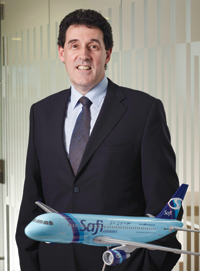
DUBAI-based Safi Airways has announced a change in management, following its recent suspension of the Frankfurt-Kabul route on January 10 in response to an EU ban.
Michael McTighe is the new chief operating officer (COO), who has plans to relaunch the airline following the ban.
Speaking to TTN, McTighe says: “Following the EU ban, towards the Afghanistan Civil Aviation Authority [MoTCA], and not Safi Airways alone, the new management team took the opportunity to undertake a strategic review of the business. We have a fleet of five aircraft which include four aircraft types and we now plan to develop a strategy of being a regional carrier with one aircraft type and simplifying everything we do.
“Our priorities include reducing our cost base, building in consistency, maintaining our position as the pre-eminent carrier on the Kabul to Dubai route and improving our customer service, these are all critical to our success going forward.”
 |
|
McTighe…consistency |
Looking back, the airline faced its fair share of challenges in 2010, though load factors remained on plan and an increase is predicted throughout 2011. “The January load factors are already very encouraging,” added McTighe.
He expects 2011 to be a year of consolidation for Safi Airways. “If the market conditions remain favourable, then in 2012 we may well return to Europe. We know the demand is there; our customers are telling us. However, going forward we will only open new routes once we have completed a detailed analysis and are confident of success.”
Key markets like Saudi Arabia and Turkey are being evaluated, though no announcements are imminent.
Safi Airways launched a corporate branding at the Arabian Travel Market in 2010. The company is now looking to reinforce this as it relaunches and refocuses the airline.
“Again, when the new team came in there were three different paint schemes on the aircraft. Everything we do must support the brand,” continued McTighe. “That is why later this year we will introduce a new uniform for our cabin crew and customer-facing teams.”
In terms of fleet, Safi plans to build around the Airbus A320-200. By the end of 2011 it will have two or three units with an additional two or three units joining in 2012. The airline is also in the process of reviewing on board service from menu selections and order of service to cabin crew uniforms and customer service training.
“The Safi Airways brand is a strong one and well-known by our customers. Our objective is to be a safe and reliable regional airline with a reputation for consistency and first-class service and, once the conditions are right, we will step back into Europe. Punctuality is key at Safi Airways. We are a small airline but expect to be profitable once our re-structuring is completed later this year,” concluded McTighe.
